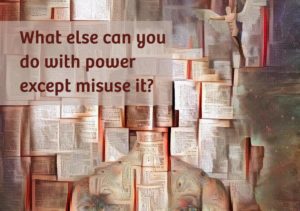Ian Harker, poet and editor of Strix magazine, explores the power and challenge of poetry.
 William Tyndale asks this question in UA Fanthorpe’s poem ‘Tyndale in Darkness’, as he struggles against the clock, under house arrest and without even a candle to see by, to finish a translation of the Bible that would give the English language so much of its poetry.
William Tyndale asks this question in UA Fanthorpe’s poem ‘Tyndale in Darkness’, as he struggles against the clock, under house arrest and without even a candle to see by, to finish a translation of the Bible that would give the English language so much of its poetry.
Fanthorpe’s Tyndale strikes me as a haunting contradiction of the stereotypical poet: he isn’t a slave of the Muse scribbling away in a garret, above the petty concerns of the world. He is indeed starving, and he suffers for his words; but he’s also right in the thick of international politics, and as a theologian and scholar and a poet too, he pays for his convictions with his life.
Of course, political poetry can bore its audience to tears—a poem needs to surprise us in some way, and it’s easy when writing a poem about, say, Brexit, to simply repeat what we can read in newspapers or what we overhear all the time on the bus or in the pub. But then love poetry can end up like the contents of a Valentine’s Day card. Even poems about the most enervating and exciting subjects (like power and its abuses, like love) can end up stale and uninspiring.
So we have to keep poetry moving, we have to keep looking for it. More and more people are doing just that: reading it, listening to it, writing and performing it. 2017 saw the best sales on records for books in the poetry category, itself a 66% increase over five years. Book sales are only one part of the story: people engage with poetry on the radio, in podcasts, on social media, and at poetry nights up and down the country.
Consequently, the definition of poetry (always contested) is broadening. The magazine I run receives over 3,000 submissions a year. The only similarity between all those poems is how different they all are. Probably every poet has their own definition of what poetry is: mine is ‘sound pattern’; and the things you can do with a sound pattern are as endless as language itself.
One of the things you can do with a sound pattern is speak words that have the power to send a shiver down people’s spine, make the hair stand up on the back of their neck. It’s the power of music and singing, the power of a prayer. It’s the kind of power a political speech-writer can only dream of.
So at the End of September, the Leeds Church Institute will open submissions for its anthology of poems Poets, Prophets and Protestors. The working title is borrowed from Canon Mark Oakley’s 2019 Hook Lecture.
Submissions will be open throughout October, and people who have perhaps never written a poem before, or not since school, are warmly invited to send in their work. Who are this city’s prophets? Where are its protestors? What stories aren’t being told? We hope to find some answers to these questions when people’s work starts landing in our intray.
Find out more about the anthology and the requirements for submitting your work here.

